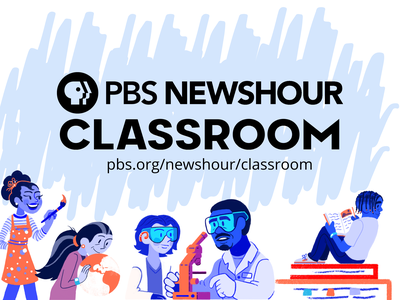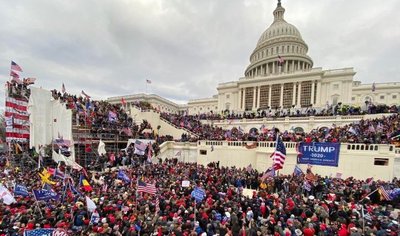Overview
As the 2022 midterm election approaches, students will encounter misinformation from politicians, candidates and partisan organizations. In this lesson, students will learn to identify and fact-check politically-motivated claims around the Inflation Reduction Act by reading laterally and upstream.
Students will also learn to narrow searches to find original congressional documents more quickly and address the following questions:
- What is the actual impact of the Inflation Reduction Act on energy production?
- How can I use lateral reading to find additional information about a claim?
- How can I read upstream to find additional information about a claim?
- How can I search effectively online for original government documents?
This lesson was developed by PBS NewsHour Student Reporting Labs in partnership with MediaWise and the Teen Fact-Checking Network, which are part of the Poynter Institute. This partnership has been made possible with support from Google.
Objectives
Students will be able to:
- Explain how the Inflation Reduction Act impacts energy production.
- Use search words to find multiple credible resources about a topic, event or issue.
- Read laterally about a topic, event or issue.
- Use “ site:congress.gov ” to search results to search the online database of original congressional documents.
- Read upstream to find original documents about a topic, event, or issue.
Subjects
Civics, Social Studies, Media LiteracyGrade Levels
Grades 9 – 12Supplemental Links
Standards
-
College, Career, and Civic Life Framework (C3)
College, Career, and Civic Life Framework (C3)
D3.1.9-12. Gather relevant information from multiple sources representing a wide range of views while using the origin, authority, structure, context, and corroborative value of the sources to guide the selection.
-
ISTE
Empowered Learner
Students leverage technology to take an active role in choosing, achieving, and demonstrating competency in their learning goals, informed by the learning sciences. (
)
Digital Citizenship
Students recognize the rights, responsibilities and opportunities of living, learning and working in an interconnected digital world, and they act and model in ways that are safe, legal and ethical. (
).
Analyze the legal and ethical responsibilities required in the arts, audio/visual technology and communications workplace.
-
CCTC
CCTC - AR 4.1 Civic and Political Institutions
In order to act responsibly and effectively, citizens must understand the important institutions of their society and the principles that these institutions are intended to reflect. That requires mastery of a body of knowledge about law, politics, and government. (NCSS D2.Civ.1.9-12 - D2.Civ.6.9-12)
Gathering and Evaluating Sources
Whether students are constructing opinions, explanation, or arguments, they will gather information from a variety of sources and evaluate the relevance of that information. (NCSS D3.1.9-12 - D3.2.9-12)
Congress passed the Inflation Reduction Act on August 15, 2022. Politically-motivated claims about the legislation showed up immediately. In this "Inflation Reduction (F)Act Check" lesson, students will learn important media literacy skills including what to look out for and what types of questions to ask when they come across social media posts that have a partisan flair.
Materials
ACTIVATOR
SLIDE 1 — ACTIVATOR: GIVE ONE - GET ONE (5 Minutes)
- Screenshot of Marsha Blackburn’s Tweet

(SLIDE 1) Presenter Notes
Present a screenshot of the original tweet that is the focus of the Fact-Check video. Let your students know that Congress passed the Inflation Reduction Act on August 15, 2022. Explain that the tweet contains five claims presented as facts.
- Give students two minutes to list two additional claims in the first column on their student handout.
- Give students two minutes to find two other claims from a peer to complete the first column of the handout.
- Use the student handout table that begins:
Tweet Claims +/- Evidence Needed to Support Position
SLIDE 2 — TITLE SLIDE “Inflation Reduction (F)Act Check” (1 Min)
(SLIDE 2) Presenter Notes
- Tell students that during an election cycle social media feeds will become flooded with information, and misinformation, from politicians, political candidates and partisan organizations, who may not always be sharing factual information in order to make themselves or their party look good or an opponent or the opposing party look bad. It is more important than ever to double-check facts in a political post before sharing it.
ACQUISITION
SLIDE 3 — “IS THAT A FACT?...” (10 Minutes)
- Table of the Claims presented as Facts
NOTE TO SELF:
(SLIDE 3) Presenter Notes
- Review the five claims from the tweet
- Ask students to place a “plus” sign in the middle column of their table (see above) if they agree with each claim, a “minus” sign if they disagree with it, and a “zero” if they are not sure.
- Then ask them to write in the third column what evidence they have to support their view if they agree or disagree, and what evidence they would need to help them fact-check the claim.
SLIDE 4 — MEDIAWISE FACT CHECK ABOUT THE POST
- Image of the Fact-Check Video
As you watch the fact-check video, write the definition of each strategy used in the table on your student handout.
lateral reading vertical reading reading upstream site:congress.gov
(SLIDE 4) Presenter Notes
- Ask students to track the definitions of the key vocabulary of the strategies used to fact-check the claim that the bill would “decrease energy production”.
SLIDE 5 — KEY VOCABULARY
- Lateral reading — Search what others say about the claim.
- Reading upstream — find the original source of a claim.
- Site:congress.gov — Keywords to search the online database of original congressional documents.
(SLIDE 5) Presenter Notes
- Lateral reading — Search what others say about the claim AND the source before you read their content. Is this a site you can trust? What do other experts in the field say about the author or the source in which it's published?
- Reading upstream — Reading upstream is the practice of finding the original source of a claim, so you're not basing your information on someone else's interpretation.
- Site:congress.gov — Keywords that tell Google only to search the online database of original congressional legislation established in 2012 by the Library of Congress .
APPLICATION
SLIDE 6 — IS THIS LEGIT?
- The U.S. is in a recession. ( Mixed )
- Inflation hit a 41-year high in the U.S. — (Legit)
- Democrats passed a bill to spend $700 billion — (Legit — but taxes offset $300 billion of the cost )
- The bill increases taxes — ( Mixed — The bill imposes a 15% minimum tax on corporations making over $1 billion and through a new excise tax on corporate stock buybacks.)
NOTE TO SELF: Sometimes a claim may be partially true.
(SLIDE 6) Presenter Notes
- Tell the students they will use these fact-checking tools to fact-check the remaining claims in the tweet to decide if they are “Legit”, “Not Legit”, or “Mixed”
- Note that sometimes claims purposefully include partially true but incomplete information that leads makes it inaccurate. This is why it is important to read upstream. If they find a claim is only partially true, marked it as “Mixed”
- You could divide the class into four groups and have each group tackle one of the remaining and report back to the class, have them work in pairs on all four, or have them work individually.
EXIT TICKET: 3 – 2 – 1
3 — List three things you learned about the Inflation Reduction Act today.
2 — List two ways you can fact check a political post that includes claims presented as facts.
1 — Describe one thing that surprised you the most about today’s lesson.
Additional Resources
- MediaWise “Is This Legit?” Series
- How To Combat Political Misinformation from PBS NewsHour Student Reporting Labs
- Fact-Checking Lesson for Student Journalists
- Misinformation Overload Interviews from PBS NewsHour Student Reporting Labs
- StoryMaker Media Literacy Learning
- Reuters Media Literacy Contest
- PBS NewsHour Classroom's Journalism in Action
MediaWise is a digital media literacy initiative of the Poynter Institute, a nonprofit, nonpartisan organization. Now in over 170 middle and high schools, PBS NewsHour Student Reporting Labs (SRL) is a national youth journalism program that trains teenagers across the country to produce stories that highlight the achievements and challenges today’s youth face.





